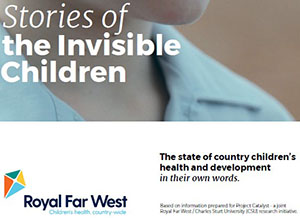* Regional Australia calls for change as overwhelmed families struggle to navigate complex health systems to access health support for children in rural and remote Australia
* Children in remote Australia five times more likely to suffer developmental problems compared to city kids
* Royal Far West launched report in Canberra, drawing on White Paper from CSU researcher in the School of Teacher Education
 Charles Sturt University (CSU) and Royal Far West (RFW) have joined with media outlet Nine Australian Community Media (ACM) to advocate for improved services to children and families in rural and remote areas.
Charles Sturt University (CSU) and Royal Far West (RFW) have joined with media outlet Nine Australian Community Media (ACM) to advocate for improved services to children and families in rural and remote areas.
They launched the Stories of The Invisible Children report at Parliament House, Canberra, on Wednesday 13 February.
The 95-year-old children’s charity RFW recognised it was essential to better understand the lived experience of the families and communities they serve, and to record the stories of the so-called ‘invisible children’.
CSU Vice-Chancellor Professor Andrew Vann, who attended the launch, said, “The University is committed to high quality education for, and research and engagement with, Australia’s regional communities.
“I am proud of our partnership with Royal Far West, a fellow organisation with a long history of service to regional, rural and remote Australians.
“We must all seriously consider the implications of the disadvantages children and families face as they attempt to gain support for developmental challenges, and ask how we can contribute to making change, to enable more children and families to live well in a world worth living in.”
Stories of The Invisible Children revealed that:
* Children in remote Australia are five times more likely to suffer developmental problems compared to city kids.
* One in three country children are unable to access the health services they need; and poor access to health services for young children living in regional communities means they are more likely to end up homeless, unemployed, incarcerated, and with personal relationship difficulties.
* The effects of such disproportionate levels of disadvantage are compounded due to poor access to appropriate services, such as allied health services and paediatricians.
* Australian GDP growth will be curbed by 10 per cent over the next 60 years without action.**
Over the past 18 months RFW, CSU and ACM have travelled across regional NSW, meeting with hundreds of parents, teachers, health workers, and community leaders to discover the daily challenges faced by country Australians as they seek to find the best supports for their children. Their stories revealed:
* Frustratingly long waiting lists
* Irregular appointments
* Travel long distances to get help
* High turnover of clinical staff
* Families paying high costs out of pocket
* No support to navigate the health system
* Impacts on parents’ mental health
* Confusion navigating the National Disability Insurance Scheme (NDIS)
* School teachers bearing the brunt
CEO of RFW Ms Lindsay Cane said, “We know that investing in the early years is the best possible investment.
“We can reduce expenditure on special education, criminal justice and welfare, and can increase productivity by boosting the workforce, reducing disadvantage and strengthening the global competitiveness of the economy.
“Country families are clearly frustrated with complex systems, long waiting lists and expensive services.
“As a caring country, we must do more to support these families who are the backbone of our nation.”
The report makes a powerful case for additional investment in rural and remote children and their families. In particular, it highlights the positive impact that telehealth is making on bridging the gap between country and city communities, and calls for significant government funding to be directed to telehealth services.
The report is available at: https://www.royalfarwest.org.au/wp-content/uploads/2019/02/Stories-of-The-Invisible-Children.pdf
The Stories of The Invisible Children report is informed by a White Paper by Dr Tamara Cumming, a researcher in the CSU School of Teacher Education in Bathurst.
Her study, Lived experiences of seeking support for rural and remote children with developmental challenges, follows from the CSU-RFW Project Catalyst, a partnership to assess the feasibility of developing a National Paediatric Telecare Service.
Dr Cumming said, “The lived experiences of families and service providers show just how complex and difficult it is to access appropriate support for children with developmental challenges in rural and remote communities.
“We hope these stories will help bring about changes that mean rural and remote children can get the help they need to thrive.”
Nine Australian Community Media helped to organise, publicise and host community consultation forums across rural and remote Australia for this initiative and research.





Social
Explore the world of social